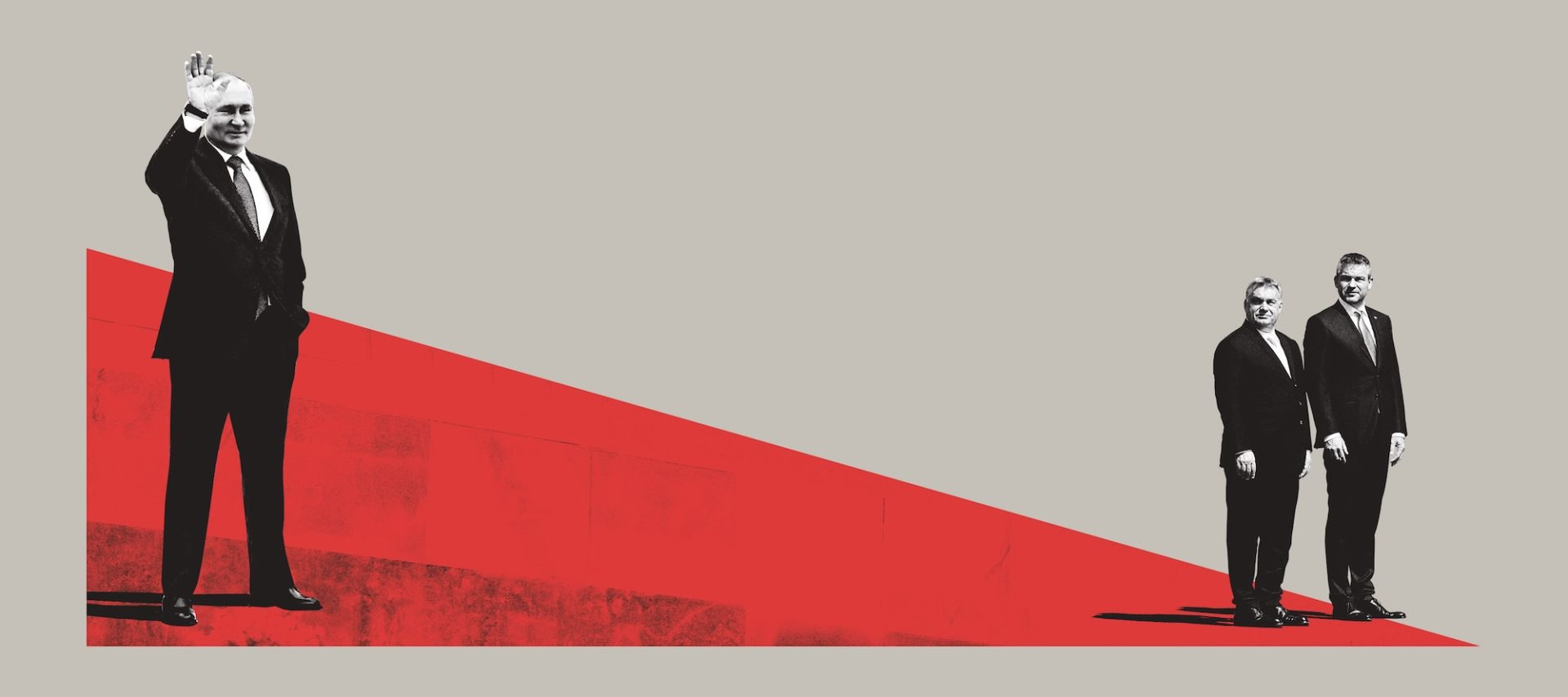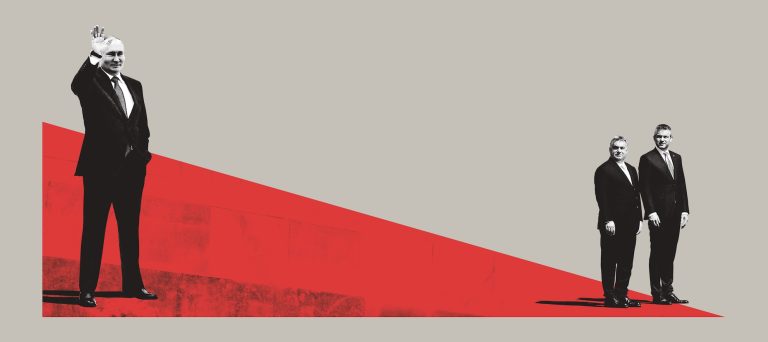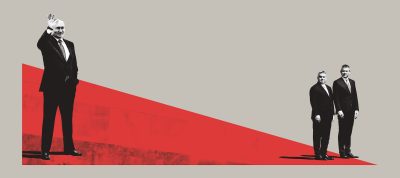Lukáš Diko (ICJK)
Illustration: Péter Somogyi szarvas (Telex) 2024-03-19
Lukáš Diko (ICJK)
Illustration: Péter Somogyi szarvas (Telex) 2024-03-19
Back in 2020, Slovakia’s then-Prime Minister Peter Pellegrini asked Viktor Orbán to act as a middleman between him and the Kremlin. He aimed for an invitation to Moscow just before Slovakia’s parliamentary election – hoping that it would appeal to the Slovak electorate. A piece of intelligence detailing the Slovak–Hungarian–Russian scheme was obtained by VSquare. Pellegrini eventually got his visit to Russia and still lost the election. However, he is currently the frontrunner in the race to become Slovakia’s next president.
Newly emerged evidence shows how Hungary and Russia worked together during the 2020 Slovak elections to help the Slovak government stay in power, all at the request of Slovakia’s then-prime minister, Peter Pellegrini. Today, the same man is the front-runner to become Slovakia’s next president (the first and second rounds of the country’s presidential election will be held on March 23 and April 6, respectively).
Pellegrini’s candidacy is supported by current Prime Minister Robert Fico, who is heavily criticized for his pro-Russian attitudes as well as for cracking down on NGOs, free media, and the country’s anti-corruption bodies. Were Pellegrini to be elected, he is expected to rubber-stamp Fico’s controversial initiatives as opposed to outgoing president Zuzana Čaputová or Pellegrini’s opposition-backed contender, former foreign minister Ivan Korčok.
According to sensitive, detailed intelligence material obtained by VSquare, Peter Pellegrini, his power slipping away, turned to Hungarian Prime Minister Viktor Orbán in February 2020 for last-minute help. Due to widespread anti-government sentiment after the 2018 murder of investigative journalist Ján Kuciak and his fiancee Martina Kušnírová, Pellegrini’s government was heading for defeat in the February 29, 2020 Slovak parliamentary elections. Pellegrini secretly asked Orbán to help arrange an official invitation to Moscow, arguing that such a visit would appeal to the Slovak electorate and boost his election chances. He used Orbán as a middleman because of the Hungarian government’s close, well-known ties to the Kremlin.
The intelligence material specifically says that Pellegrini told Orbán that an invitation to Moscow would help him to win the Slovak elections. It also clearly indicates that the Russian and Hungarian governments had high-level discussions on helping Pellegrini stay in power.
After Pellegrini’s plea, Orbán tasked his foreign minister, Péter Szijjártó, with conveying the message through Russian Foreign Minister Sergey Lavrov, with whom Szijjártó enjoys a friendly relationship. Lavrov then forwarded the request to Russian Prime Minister Mikhail Mishustin. Subsequently, Pellegrini was received in Moscow just a few days before the Slovak parliamentary elections. The intelligence material also goes into detail about the Orbán government’s own deliberations: For example, they discussed with their Russian counterparts why it is also in Hungary’s own interest for the Pellegrini-led Slovak coalition, including Andrej Danko’s nationalist party, to continue to govern.
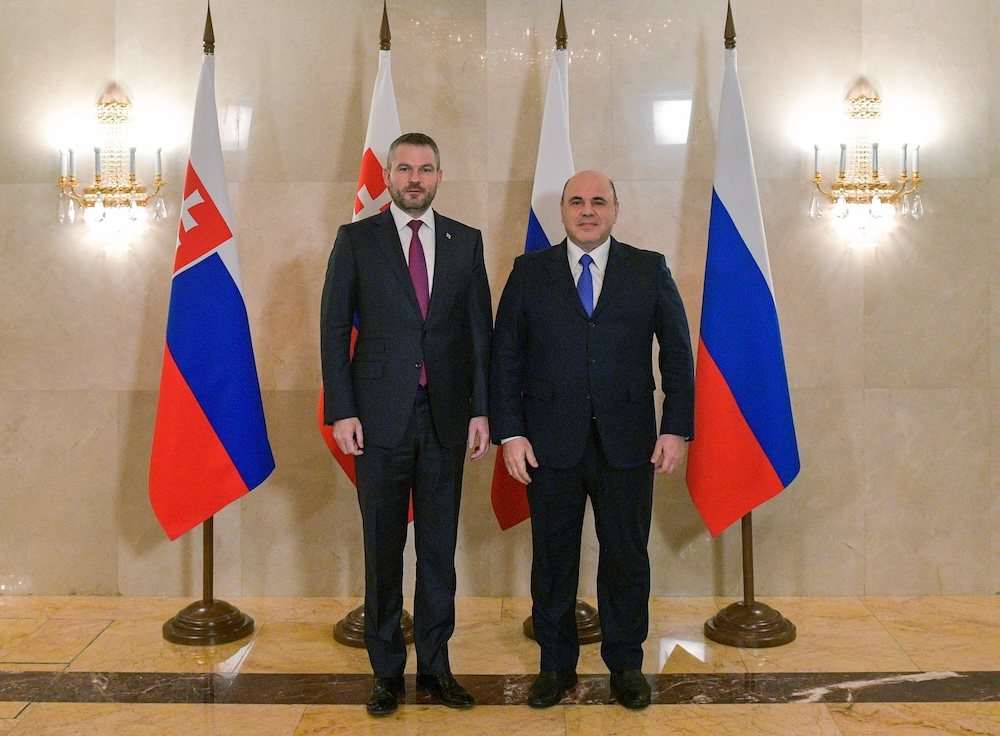
Slovakia’s Prime Minister Peter Pellegrini (L) and his Russian counterpart Mikhail Mishustin pose during a meeting in Moscow, Russia, 26.02.2020. Source: Alexander Astafyev / TASS / Forum
The intelligence material on the Hungarian-Russian backing of Pellegrini’s re-election was compiled by a European country’s intelligence agency in February 2020 and obtained by VSquare, then shared with Frontstory.pl and the Investigative Center of Ján Kuciak (ICJK.sk).
Due to the sensitive nature of the material, as well as for the protection of sources, a representative of this European intelligence agency asked us not to name their country or to disclose certain specific information from the material, which we have seen directly. We also managed to confirm multiple parts of the intelligence material from other sources and have no doubts about its authenticity.
We sent comment requests to the press officers of Peter Pellegrini and Viktor Orbán, the Office of the Prime Minister of the Russian Federation, the Ministry of Foreign Affairs of the Russian Federation and the Hungarian Ministry of Foreign Affairs and Trade. Only the latter replied, with the following statement by ministry spokesman Máté Paczolay: “As Péter Szijjártó said, if the Ministry of Foreign Affairs and Trade receives a request to help establish or maintain contacts with other countries, and the request is not contrary to Hungarian national interests, we are always ready to help. This is called diplomacy.”
The ministry was referring to a recent remark by Szijjártó. When reacting to criticism from Donald Tusk about his frequent meetings with Sergey Lavrov, the Hungarian foreign minister admitted openly that he regularly acts as a middleman between European politicians and the Kremlin. “I think the Prime Minister of Poland would be surprised to know how long the list of European politicians who have asked me in recent years to help them to make contact with the Russians, to set up a meeting or just to get a message across. In fact, there have been countries where representatives of opposing sides have asked me to do this, so if there is a request in the future, I will of course be happy to help,” Szijjártó said.
Moscow is more important than Washington DC
Peter Pellegrini became prime minister of Slovakia in March 2018. Public backlash over the murder of Ján Kuciak and Martina Kušnírová forced Pellegrini’s predecessor, Robert Fico, to resign. In an attempt to calm down tens of thousands of protesters and quell widespread anti-government sentiment, and to prevent early elections, Fico stepped back, opting for a more palatable (but still politically friendly) successor to lead Slovakia until the next elections.
As the 2020 February Slovak parliamentary elections were nearing, on February 13, 2020, Prime Minister Pellegrini visited Hungary at the invitation of Viktor Orbán. The prime ministers traveled together to the southern Hungarian town of Röszke, where they inspected the Hungarian-Serbian border fence and talked about the dangers of illegal migration, according to a press statement. Orbán spoke fondly of Pellegrini and emphasized the help Slovakia provided to Hungary in tackling “illegal migration,” the Hungarian government’s main campaign message at the time. The official readout of the Pellegrini-Orbán meeting did not mention in any way that they discussed Russia-related matters.
However, according to the intelligence material obtained by VSquare, it was at this meeting that Pellegrini asked Orbán to help him secure a last-minute visit to Moscow before the Slovak elections. According to the material, Pellegrini entrusted his Hungarian allies with this request because he knew that both Orbán and Vladimir Putin, as well as Péter Szijjártó and Sergey Lavrov, have good personal relations. Pellegrini also explained to Orbán that an invitation to Moscow was much more important to him than a visit to the White House because of the attitudes of Slovak society. Pellegrini turned to the right people: Orbán immediately delegated the task to Szijjártó, who then quickly forwarded the Slovak leader’s request to Lavrov, who passed it on to Mishustin.
The material compiled by a European country’s intelligence agency also reveals the Orbán government’s own interests in backing Pellegrini’s request. The Hungarian government thought that, if the Slovak opposition were to win, it would mean the end of pragmatic cooperation between Central European countries, known as the Visegrád Group cooperation. Ironically, during a discussion between Hungarian and Russian government officials, it was the Slovak opposition that was portrayed as being under foreign influence and allegedly funded by Hungarian-American billionaire George Soros, according to the intelligence material.
When discussing the importance of Pellegrini’s possible invitation to Moscow in the final days of the Slovak election campaign, the Hungarians also indicated that it would also be in their interest if Andrej Danko’s Slovak National Party (SNS) – Smer’s junior coalition partner – were to cross the 5 percent threshold and make it into the Slovak parliament again. This suggestion at the time was rather puzzling given that Andrej Danko and his party had a track record of inciting anti-Hungarian sentiment.
On February 26, 2020, just three days before the Slovak election, Pellegrini was finally received by Russian Prime Minister Mikhail Mishustin. “It is very important for us that despite the very busy pre-election period in Slovakia you managed to find the time to come to Moscow and discuss the most pressing issues of Russian-Slovak cooperation,” Mishustin told Pellegrini at their joint press conference, pretending that it was Pellegrini who was doing Russia favor by traveling to Moscow.
Pellegrini was the first European leader to meet Mishustin after the new Russian prime minister was sworn into office in January 2020. They discussed how the Russian Federation and Slovakia might cooperate in areas like gas transmission, supplies of nuclear fuel and decommissioning of nuclear waste. Pellegrini suggested that Russia could also be involved in a project for establishing a nuclear waste dump for Central European countries. The “project” has not been mentioned since that meeting.
The visit has been seen as a last attempt to stop Smer’s descent in pre-election polls. While leaders of other political parties campaigned, a few days before the elections, Pellegrini was hospitalized with acute respiratory infection. Against the recommendations of his doctors, Pellegrini interrupted the hospitalization, participated in a pre-election debate on the most watched TV, and traveled to Russia the next day.
By that time, Slovakia had already started to turn in Russia’s direction. For example, in the spring of 2018, Danko prevented the expulsion of a Russian diplomat from Bratislava, even as Western allies were kicking out hundreds of them in reaction to Sergei Skripal’s poisoning in Salisbury. Then, in June 2019, Pellegrini had a meeting with Russian president Vladimir Putin. But despite all of this, Slovak voters in 2020 were mainly motivated not by fondness for Russia, but by the murder of Ján Kuciak and Martina Kusnirova in 2018. “I think that, at the time, other topics did not work so well. Robert Fico stepped down as prime minister. Peter Pellegrini became the new prime minister. That means even the strength of Smer was divided, at least in the eyes of their voters. But I think that the narrative of anti-Russian versus pro-Russian topics was not as strong then as it has been in recent years,” Václav Hřích of the Slovak agency AKO, which specializes in public opinion surveys, told ICJK.
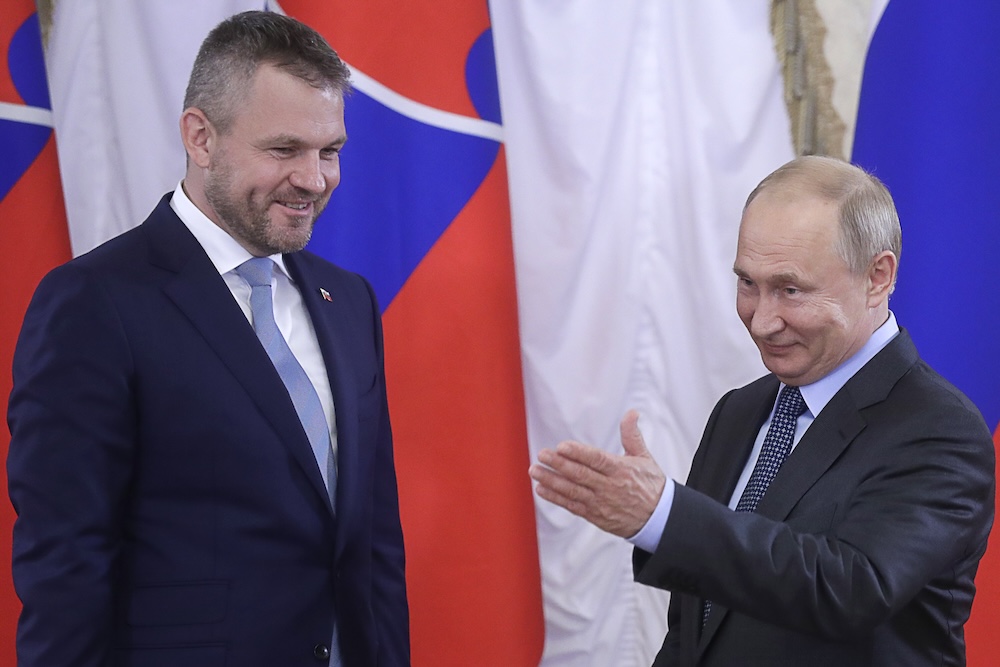
Slovakia’s Prime Minister Peter Pellegrini (L) and Russia’s President Vladimir Putin during a meeting at the 23rd St Petersburg International Economic Forum, 06.06.2019. Source: Mikhail Metzel / TASS / Forum
Pellegrini’s plan did not work out. Not even this last-minute visit to Moscow could save his government in the Slovak parliamentary election on February 29, 2020. His Smer party only came second with 18,3 percent of the votes, while Danko’s SNS dropped out of parliament with a mere 3,16 percent.
Slovakia in the crosshairs of foreign meddling
The specific intelligence obtained by VSquare details only what happened in February 2020. It does not include information on what happened and why in the following years, during which time Russian influence in Slovakia grew remarkably.
A few months after his electoral defeat, Pellegrini quit Smer and founded a more moderate party, Hlas, while Robert Fico stayed at the helm as leader of Smer and steered it into an even more populist, openly anti-vax, pro-Russian direction. Even before the full-scale Russian invasion of Ukraine, Slovakia was heavily targeted by pro-Russian propaganda. Fico and Smer, supported by a growing disinformation environment peddling Kremlin narratives, strongly opposed the adoption of the US-Slovak Defense Cooperation Agreement, which was ratified in Slovakia in the beginning of 2022, mere weeks before Russia’s all-out invasion of Ukraine began.
“With the beginning of the war in Ukraine, the Russian Federation focused very strongly on Slovakia and it was actually the main target of that Russian propaganda, which, as a side note, should not surprise anyone. I always say that if I were sitting in the Kremlin and given such an assignment to systematically meddle within the European Union, I would focus on Slovakia as well. Because it is like sports: you always focus on the weakest link of the other team and you try to defeat that team just like that, it’s normal. Well, Slovakia is absolutely clearly the weakest link of what is called the Global West and the European Union,” sociologist Michal Vašečka told ICJK.
Few weeks into the full-scale invasion, Slovak intelligence agencies uncovered networks of Russian spies. Their ranks included a professor at a military academy who had been delivering sensitive information to Russian contacts since 2013 and a contributor to a Slovak disinformation news site who was secretly recorded by Slovak intelligence while receiving money and assignments from the military attaché of the Russian Embassy in Bratislava. Both were charged with espionage, and the Russian “diplomat,” a GRU spy, was expelled from the embassy along with tens of his colleagues.
At the same time, the liberal, right-wing Slovak government that succeeded Fico and Pellegrini and was in power from 2020 to 2023 strongly supported Ukraine and donated important weaponry, including the S-300 surface-to-air missile system that was secretly delivered in the beginning of April 2022. However, this secret transport was disclosed to the public by Fico, who published video footage of the transport on his social media accounts, openly criticizing it and risking the S-300 system’s safe delivery to Ukraine. Fico’s narrative was supported by disinformation and pro-Russian actors on Slovak social media networks.
Despite the Slovak government’s strategic communication and anti-disinformation measures to try to stop the influx of pro-Russian propaganda, Slovak information spaces were flooded with Kremlin narratives. ICJK investigated numerous actors who spread pro-Russian narratives, including on Telegram, and through the Crimea-based NewsFront disinformation network, which has been active throughout Europe.
A GLOBSEC poll published in May 2023 showed how successful pro-Russian propaganda had become in Slovakia: According to its findings, more than a half of Slovaks blamed the West or Ukraine for the war, while only 40 percent felt that Russia was responsible. This was the worst result from any of the eight Central Eastern European countries surveyed. The success of pro-Russian propaganda in the country was connected to its amplification by Slovak politicians on social media networks.
The coalition of right-wing and liberal parties that rode an anti-corruption wave and dethroned the Smer-led government gave way to quarreling and eventually collapsed. Robert Fico, the most popular politician on Slovak Facebook, and his Smer party gained momentum thanks in part to pro-Russian sentiment, which he was able to use to win the early parliamentary elections on September 30, 2023. Pellegrini’s Hlas party, which previously topped opinion polls, ended up in third place, and became one of Fico’s junior coalition partners, together with Andrej Danko’s SNS (which found its way back into parliament).
Russian and Hungarian meddling in the September 2023 Slovak election campaign was previously revealed in articles by both VSquare and ICJK. In a previous issue of VSquare’s Goulash newsletter, we revealed that top Viktor Orbán campaign adviser Árpád Habony and the Hungarian government-linked Századvég advisory firm helped Pellegrini’s Hlas party and Fico’s Smer. In another newsletter issue, we wrote about the relatively high number of Hungarian undercover intelligence officers in Slovakia, and revealed that one of them, Ambassador Csaba Balogh, had a confidential meeting with his Russian counterpart during the Slovak election campaign.
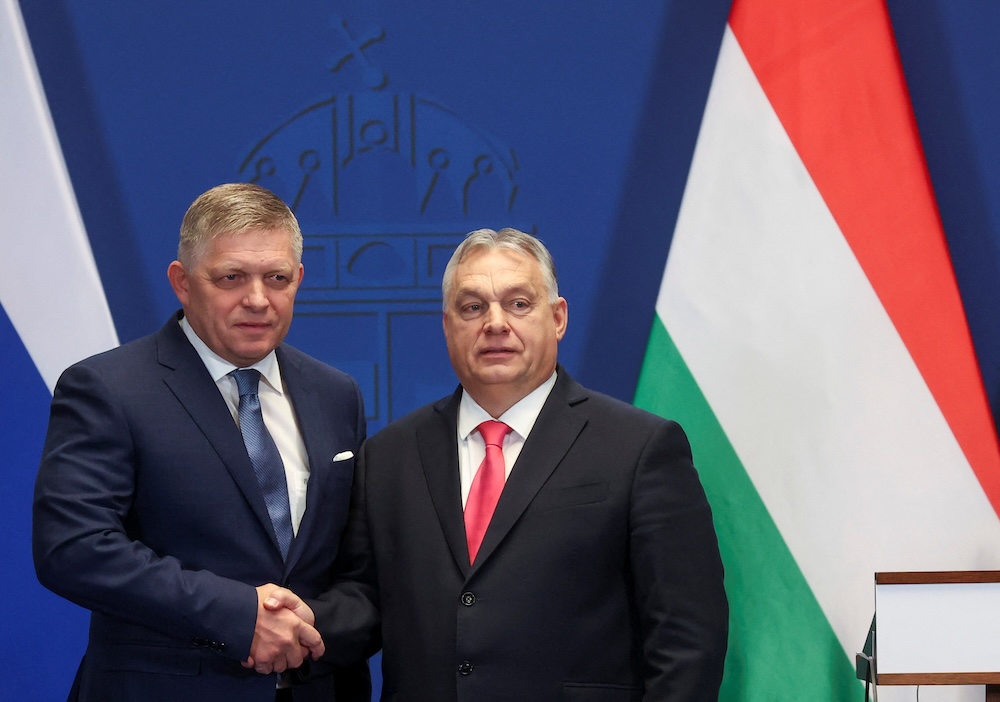
Slovak Prime Minister Robert Fico shakes hands with Hungarian Prime Minister Viktor Orban during a joint press conference in Budapest, Hungary, 16.01.2024. Source: BERNADETT SZABO / Reuters / Forum
Robert Fico’s anti-migrant campaign message was also bolstered by the Hungarian government’s English-language “anti-migrant” YouTube advertisements, which targeted seven European countries, including (and most significantly) Slovakia, where it started airing in the final days before the election, after the so-called campaign silence period had already begun. Meanwhile, ICJK revealed how pro-Russian actors spread a deepfake hoax – a fake conversation alleging that the United States conspired to rig the elections — in the final stages of the election campaign. ICJK also identified the Russian spy who, under diplomatic cover, tried to impact the outcome of the election by influencing public opinion (and who got expelled for it).
Pellegrini needs pro-Russian voters to become president
After the 2023 election, Pellegrini became the Slovak parliament’s new speaker. But now, with the support of Robert Fico, he is a presidential candidate, and leading in the polls. As pollster AKO’s Václav Hřích explained to ICJK, before the parliamentary election, Smer and SNS were the ones pushing pro-Russian messages, while Pellegrini and Hlas “tried not to communicate this topic too much.” Moreover, Pellegrini was even seen as supportive of Ukraine.
However, sociologist Michal Vašečka says that Pellegrini will now have to reach to the pro-Russian and far-right voters if he wants to become president. “The reasoning is very simple. He has no chance of winning in the first round, but only in the second round. If anti-establishment voters who primarily support Štefan Harabin, but also Marian Kotleba, Róbert Švec and Andrej Danko, do not come to the second round, Pellegrini may have a problem. But it looks like, if they come and vote, then Peter Pellegrini will be the president. He has no other chance than to appeal to them if he wants to be elected,” Vašečka added.
According to a recent pre-election poll, conducted by Focus, Pellegrini only leads the other main presidential contender, Ivan Korčok, by 34.4 to 33.1 percent in the first round. However, with the support of the aforementioned candidates’ voters, he could beat Korčok 56-44 percent in the second round.
There is no indication that another last-minute trip to Moscow is in the cards for Peter Pellegrini. However, he already completed his usual pre-election visit to Hungary. On March 11, the government-backed presidential frontrunner received the red carpet treatment in Budapest. Although he is officially just the speaker of Slovakia’s parliament, Pellegrini was not only welcomed by his Hungarian counterpart, but also by President Tamás Sulyok and, most importantly, Prime Minister Viktor Orbán. According to usual diplomatic protocol, foreign dignitaries are received on their own level during official visits.
Pellegrini’s warm welcome was understood to be a clear endorsement by the Hungarian government of his Slovak presidential candidacy. At their joint press conference, Orbán openly praised Pellegrini, saying he had had the privilege of working with him when Pellegrini was prime minister, during which time the Hungarian-Slovak friendship gained in strength and they found the common points upon which good neighborly relations could be built. These days, the most important of those common points is, according to Viktor Orbán, that both countries pursue a “pro-peace policy” – meaning opposition to military support for Ukraine and advocating for appeasement with Russia.
The article was also published in Slovak on icjk.sk and in Polish on frontstory.pl.
Subscribe to Goulash, our original VSquare newsletter that delivers the best investigative journalism from Central Europe straight to your inbox!
VSquare’s Budapest-based lead investigative editor in charge of Central European investigations, Szabolcs Panyi is also a Hungarian investigative journalist at Direkt36. He covers national security, foreign policy, and Russian and Chinese influence. He was a European Press Prize finalist in 2018 and 2021.
Lukáš Diko is the editor-in-chief at the Investigative Center of Ján Kuciak (ICJK). An experienced journalist and media leader, he was previously director of news and journalism at RTVS and editor-in-chief of news at Markíza television.

